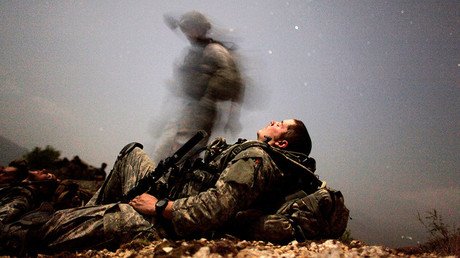Taliban militants have taken control of a key area in the north of Afghanistan, a local official has said, blaming the latest defeat on the central government’s failure to provide adequate military support to fend off the attack.
The terrorists launched a series of coordinated attacks in the northern Sari Pul province Saturday, taking control of the strategic Mirzawalang area in Sayad district, Zabi Amani, a spokesman for the provincial governor, told AP.
“We requested reinforcement from the central government, unfortunately couldn’t get any support, that is why the forces lost control of Mirzawalang,” Amani said.
Ten militants and seven security force oficers were killed in over two days of gun battles in the province. The attack was reportedly launched from three directions from areas that had fallen under the Taliban’s control earlier.
There's also unconfirmed reports that ten civilians had also been killed, according to Amani.
The Taliban has recently stepped up its attacks, mostly in the south of the country. In late July, Taliban fighters raided and seized the district of Jani Khel in Paktia province lying south of Kabul. The fall of Jani Khel marked the straight third victory by the Islamists in just four days.
Previously, the Taliban overran Kohistan district in the northern Faryab province after storming the district government’s headquarters, forcing local security forces to retreat to another base. Just hours after the capture of Kohistan, Taliban fighters seized the Taywara district in western Ghor province.
The group still has a significant presence in the country despite the US-led war in Afghanistan which has been raging on for nearly seventeen years since the 2001. Since then, tens of thousands of lives have been lost while Afghanistan remains plagued by deep-seated corruption, terrorism and tribal animosities.
Washington is estimated to have spent over $700 billion on military assistance, reconstruction and economic aid to Afghanistan, but a large portion of that money appears to have been squandered by the country’s military and political elites.
President Donald Trump has vowed to take charge of the situation, reportedly saying at a staff meeting: “We aren't winning, we’re losing.” Trump has contemplated firing and replacing Army General John Nicholson, commander of US troops in Afghanistan, as well as deploying an additional 4,000 troops, as a new, more assertive way of winning the war.
However, the US is not likely to ever achieve victory in Afghanistan without involving other regional players, believes former Pentagon official Michael Maloof.
“The military solution itself isn’t going to work. It hasn’t worked before with more troops. It’s not going to work even if he (Trump) orders another 4,000,” he told RT. The former Pentagon official proposed a “hybrid approach of military and diplomatic initiatives” for Afghanistan.
Maloof reminded that the previous round of peace negotiations in the country broke down after the US announced the withdrawal of its troops and the “Taliban said, ‘well, why should we talk?' We should wait for you to leave and do what we want to do.”

